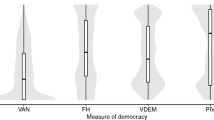Abstract
The paper studies the relative merits of direct and representative legislation in a setting where voters are uncertain both with respect to the likely consequences of different policies and with respect to the political preferences of their fellow citizens. Under representative legislation, the latter translates into uncertainty on the elected official’s future policy intentions which involves a loss of control. The resulting discretionary power, however, also leads officials to endogenously acquire competence on the issues they oversee and specialize in policy formation. Policies determined in representative democracies are therefore better tailored to relevant contingencies but less close to the preferences of a majority than those determined in popular ballots. It is shown that the extent of the resulting trade-off depends on the set of alternatives among which the policy is to be chosen. Two extensions, referenda and the possibility of re-election, are briefly considered.
Similar content being viewed by others
References
Aghion, P. and Tirole, J. (1997). Formal and real authority in organizations. Journal of Political Economy 105: 1–29.
Besley, T. and Coate, S. (1997). An economic model of representative democracy. Quarterly Journal of Economics 112: 85–114.
Besley, T. and Coate, S. (1998). Sources of inefficiency in a representative democracy: A dynamic analysis. American Economic Review 88: 139–156.
Bundesamt für Statistik (1999). Statistisches Jahrbuch der Schweiz 1999. Zürich: Neue Züricher Zeitung Buchverlag.
Collier, K., Ordeshook, P. and Williams, K. (1989). The rationally uninformed electorate: Some experimental evidence? Public Choice 60: 3–29.
Cukierman, A. and Tommasi, M. (1998). When does it take a Nixon to go to China? American Economic Review 88: 180–197.
De Groot, M. (1970). Optimal statistical decisions. New York: Mc Graw-Hill.
Downs, A. (1957). An economic theory of democracy. New York: Harper and Row.
Feld, L. and Kirchgässner, G. (2000). Direct democracy, political culture, and the outcome of economic policy: A report on the Swiss experience. European Journal of Political Economy 16: 287–306.
Feld, L. and Matsusaka, J.G. (2003). Budget referendums and government spending: Evidence from Swiss cantons. Journal of Public Economics 87: 270–272.
Feld, L. and Savioz, M.R. (1997). Direct democracy matters for economic performance. Kyklos 50: 507–538.
Feldmann, S.E. (1999). Legislative bargaining and the initiative. Unpublished manuscript. University of Chicago.
Frey, B. (1994). Direct democracy: Politico-economic lessons from Swiss experience. American Economic Review (Papers and Proceedings) 84: 338–342.
Gerber, E.R. (1999). The populist paradox: Interest group influence and the promise of direct legislation. Princeton: Princeton University Press.
Harrington, J.E. (1993). Economic policy, economic performance, and elections. American Economic Review 83: 27–42.
Hotelling, H. (1929). Stability in competition. Economic Journal 39: 41–57.
Kalt, J.P. and Zupan, M.A. (1990). The apparent ideological behavor of legislators: Testing for principal-agent slack in political institutions. Journal of Law and Economics 33: 103–131.
Kirchgässner, G. (1992). Towards a theory of low-cost decisions. European Journal of Political Economy 8: 305–320.
Lupia, A. (1992). Busy voters, agenda control, and the power of information. American Political Science Review 86: 390–403.
Marino, A.M. and Matsusaka, J.G. (2003). Decision processes, agency problems, and information: An economic analysis of budget procedures. The Review of Financial Studies, forthcoming.
Matsusaka, J.G. (1992). The economics of direct legislation. Quarterly Journal of Economics 107: 541–571.
Matsusaka, J.G. (1995). The economic approach to democracy. In M. Tommasi and K. Ierulli (Eds.), The new economics of human behavior, 140–154. Cambridge: Cambridge University Press.
Matsusaka, J.G. and McCarthy, N.M. (2001). Political recourse allocations: The benefits and costs of voter initiatives. Journal of Law, Economics and Organization 17: 413–448.
Niskanen, W.A. (1971). Bureaucracy and representative government. Chicago: Aldine-Atherton.
Osband, K. (1989). Optimal forecasting incentives. Journal of Political Economy 97: 1091–1112.
Osborne, M.J. and Slivinski, A. (1996). A model of political competition with citizen candidates. Quarterly Journal of Economics 111: 65–96.
Pommerehne, W.W. (1983). Private versus öffentliche Müllabfuhr–Nochmals betrachtet. Finanzarchiv 41: 466–475.
Romer, T. and Rosenthal, H. (1979). Bureaucrats versus voters: On the political economy of resource allocation by direct democracies. Quarterly Journal of Economics 95: 563–587.
Santerre, R.E. (1989). Representative versus direct democracy: Are there any expenditure differences? Public Choice 60: 145–154.
Schneider F. (1999) Die Entwicklung der Sozialpolitik in Repräsentativen und in Direkten Demokratien: Königsweg oder Sackgasse? Einige Bemerkungen aus der Public Choice-Perspektive, Discussion Paper 9910, University of Linz.
Steunenberg, B. (1992). Referendum, initiative, and veto power: Budgetary decision making in local government. Kyklos 45: 501–529.
Tullock, G. (1980). Efficient rent seeking. In J.M. Buchanan, R.D. Tollison and G. Tullock (Eds.), Toward a theory of the rent-seeking society. College Station: Texas A&M Press.
Author information
Authors and Affiliations
Corresponding author
Additional information
I am grateful to Christoph Lülfesmann, Patrick Schmitz and Urs Schweizer for helpful comments and discussions, as well as an anonymous referee who provided valuable comments on an earlier draft. The author also wishes to thank the Haas School of Business at UC Berkeley for its hospitality and the German Academic Exchange Service ‘Hochschulsonderprogramm III’ for its financial support. All errors are my own.
Rights and permissions
About this article
Cite this article
Kessler, A.S. Representative versus direct democracy: The role of informational asymmetries. Public Choice 122, 9–38 (2005). https://doi.org/10.1007/s11127-005-1682-x
Accepted:
Issue Date:
DOI: https://doi.org/10.1007/s11127-005-1682-x




